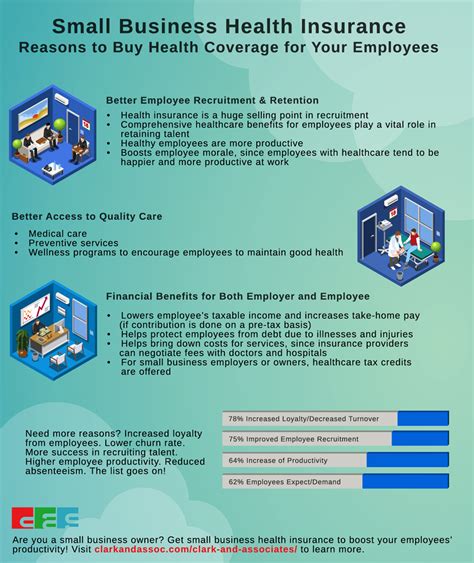How To Get Health Insurance For My Small Business

Providing health insurance to your small business employees is a significant step towards creating a comprehensive benefits package and fostering a positive work environment. In the United States, the options for small business health insurance can seem daunting, but with the right approach and understanding of the available resources, it becomes a manageable task. This comprehensive guide will walk you through the process, from exploring your options to selecting the best plan for your business and employees.
Understanding Your Options: A Comprehensive Overview

When it comes to health insurance for small businesses, the market offers a range of plans and providers to choose from. Understanding the different types of insurance plans is the first step in making an informed decision.
Traditional Health Insurance Plans
These are the most common types of health insurance plans offered by carriers such as UnitedHealthcare, Blue Cross Blue Shield, and Aetna. They typically provide a wide range of coverage options, including preventative care, hospital stays, and prescription medications. The cost of these plans can vary depending on the level of coverage and the number of employees enrolled.
| Plan Type | Coverage Highlights |
|---|---|
| PPO (Preferred Provider Organization) | Flexibility to choose doctors and hospitals within a network, with out-of-network coverage available at a higher cost. |
| HMO (Health Maintenance Organization) | Affordable plans with a designated primary care physician and a network of specialists, requiring referrals for specialist visits. |
| EPO (Exclusive Provider Organization) | Similar to PPOs, but with a more limited network and no out-of-network coverage. |

Alternative Health Insurance Plans
In recent years, alternative health insurance plans have gained popularity due to their unique features and cost-effectiveness. These plans often cater to specific demographics or healthcare needs and can be a great fit for certain small businesses.
- Health Reimbursement Arrangements (HRAs): These plans allow employers to reimburse employees for their healthcare expenses, including premiums and out-of-pocket costs. HRAs are particularly useful for small businesses with a young and healthy workforce, as they can help offset the cost of healthcare while providing flexibility.
- Reference-Based Pricing (RBP) Plans: RBP plans are based on the concept of paying for medical services based on a set price, rather than the usual fee-for-service model. This can lead to significant cost savings, especially for small businesses with a limited budget. However, it's important to ensure that the plan's reference prices are reasonable and competitive.
- Association Health Plans (AHPs): AHPs allow small businesses to band together and offer health insurance plans to their employees, similar to what larger corporations can provide. By pooling resources, small businesses can negotiate better rates and coverage options.
Assessing Your Business’s Needs: A Strategic Approach

Before diving into the selection process, it’s essential to assess your business’s unique needs and circumstances. This will help you tailor your health insurance offering to best support your employees and your business goals.
Analyzing Your Workforce
Understanding the demographics and healthcare needs of your workforce is a critical first step. Consider factors such as the average age of your employees, their family statuses, and any prevalent health conditions within the group. This information will guide you in choosing a plan that provides adequate coverage for your employees without unnecessary costs.
Evaluating Your Business’s Financial Capacity
Health insurance is a significant expense for any business, and it’s crucial to ensure that your financial resources can support the plan you choose. Calculate the potential cost of various plans, taking into account the number of employees, their expected utilization of healthcare services, and the plan’s premium structure. Consider whether your business can afford a higher premium for more comprehensive coverage or if a more affordable plan with a higher deductible is a better fit.
Understanding Legal Requirements
Small businesses are subject to various legal requirements regarding health insurance, including compliance with the Affordable Care Act (ACA). Familiarize yourself with the ACA’s provisions, such as the requirement to offer health insurance to full-time employees if you have 50 or more of them, and ensure that your chosen plan meets these standards. Failure to comply can result in penalties and legal complications.
Navigating the Selection Process: A Step-by-Step Guide
With a solid understanding of your options and your business’s needs, it’s time to select the right health insurance plan for your small business. Here’s a detailed guide to help you through this process.
Step 1: Research and Compare Plans
Start by researching the various health insurance plans available in your area. Contact multiple insurance carriers and request quotes and plan details. Compare the plans based on their coverage, network of providers, and cost. Pay attention to the plan’s annual limits, deductibles, copays, and coinsurance, as these can significantly impact your employees’ out-of-pocket expenses.
Step 2: Evaluate Plan Features and Benefits
Beyond the basic coverage, many health insurance plans offer additional features and benefits that can be valuable to your employees. Look for plans that include wellness programs, telemedicine services, and mental health support. These features can enhance the overall employee experience and contribute to a healthier workforce.
Step 3: Seek Professional Advice
Consider consulting with a benefits advisor or broker who specializes in small business health insurance. These professionals can provide valuable insights and guidance, helping you navigate the complex world of health insurance. They can also negotiate with insurance carriers on your behalf, potentially securing better rates and terms for your business.
Step 4: Present Options to Your Employees
Once you’ve narrowed down your choices, it’s time to present the selected plans to your employees. Provide clear and concise information about the benefits and costs of each plan. Allow your employees to ask questions and provide feedback, as their input can be invaluable in making the final decision. Remember, the health insurance plan you choose should be a collaborative effort, ensuring that it meets the needs of both your business and your employees.
Step 5: Implement and Monitor the Plan
After selecting a plan, work with your insurance carrier to implement the health insurance benefits for your small business. Ensure that all necessary paperwork is completed and that your employees understand the enrollment process. Regularly monitor the plan’s performance and utilization, and be prepared to make adjustments as needed. Stay informed about any changes in healthcare legislation that could impact your plan.
The Impact of Health Insurance on Your Small Business
Offering health insurance to your small business employees can have a significant impact on various aspects of your business operations.
Attracting and Retaining Top Talent
In today’s competitive job market, a comprehensive benefits package, including health insurance, can be a powerful tool for attracting and retaining talented employees. By providing access to quality healthcare, you demonstrate your commitment to your employees’ well-being, which can lead to increased job satisfaction and loyalty.
Promoting a Healthy Workforce
Health insurance plays a crucial role in promoting the overall health and wellness of your employees. With access to preventative care, screenings, and regular check-ups, your workforce can stay healthy and productive. Additionally, many health insurance plans offer wellness programs and incentives, encouraging employees to adopt healthier lifestyles and manage chronic conditions effectively.
Financial Stability and Business Growth
While health insurance is an additional expense for small businesses, it can also contribute to long-term financial stability and growth. A healthy workforce means fewer sick days and increased productivity, which can positively impact your bottom line. Furthermore, by offering health insurance, you may be eligible for certain tax credits and incentives, further offsetting the cost of providing this valuable benefit.
Conclusion: Empowering Your Small Business with Health Insurance

Providing health insurance to your small business employees is a strategic decision that can have far-reaching benefits. From attracting top talent to promoting a healthy workforce and supporting your business’s financial stability, health insurance is a vital component of any comprehensive benefits package. By understanding your options, assessing your needs, and following a structured selection process, you can confidently navigate the world of small business health insurance and make informed choices that benefit both your business and your valued employees.
How much does small business health insurance typically cost?
+The cost of small business health insurance can vary significantly based on factors such as the size of your business, the age and health status of your employees, the plan’s coverage and benefits, and your location. On average, small businesses can expect to pay anywhere from 400 to 1,200 per employee per month for health insurance. However, it’s important to note that these are just rough estimates, and the actual cost can be higher or lower depending on your specific circumstances.
Are there any tax benefits for small businesses that offer health insurance?
+Yes, small businesses that provide health insurance to their employees may be eligible for tax credits and deductions. The Small Business Health Care Tax Credit is available to certain small businesses that meet specific criteria, offering a tax credit of up to 50% (35% for non-profit organizations) of their contribution towards employee health insurance premiums. Additionally, small businesses can deduct the cost of health insurance premiums as a business expense, further reducing their tax liability.
What happens if I don’t offer health insurance to my employees as a small business owner?
+If you are a small business owner with 50 or more full-time employees, you are subject to the Employer Shared Responsibility provision of the Affordable Care Act (ACA). This provision requires you to offer health insurance coverage to your full-time employees or face potential penalties. The penalty, known as the Employer Shared Responsibility Payment, is calculated based on the number of full-time employees who do not receive affordable health insurance and may be substantial. However, for smaller businesses with fewer than 50 full-time employees, there is no legal requirement to offer health insurance, although it is still highly recommended to attract and retain talent.



